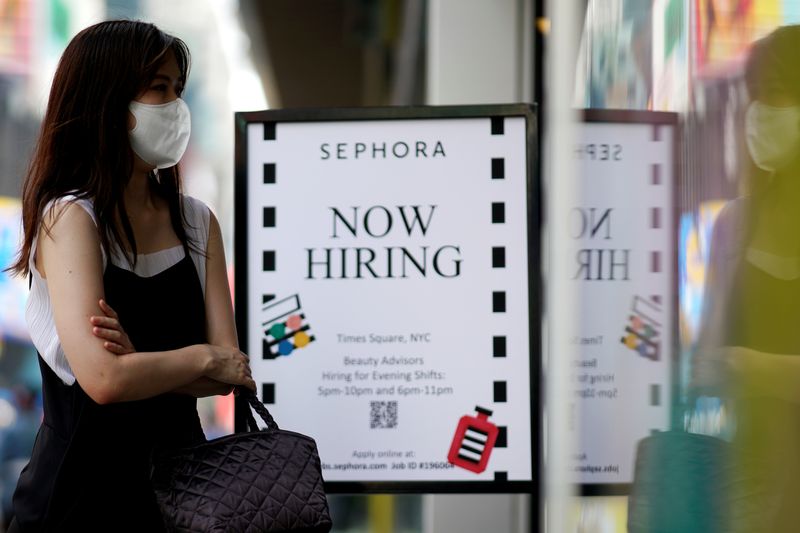LONDON (Reuters) -The July 4 holiday in the United States may well bring a quiet start to the week for world markets. But don't bet on it.
China and Japan are worried about currency weakness, meaning investors are alert for signs of action from authorities. Australia's central bank meets and the most closely-watched U.S. economic indicator is out Friday.
Here's a look at the week ahead in markets from Lewis Krauskopf in New York, Kevin Buckland in Tokyo, and Naomi Rovnick, Amanda Cooper and Karin Strohecker in London.
1/ TIME FOR SOME NON-FARM
Investors betting on resiliency of the U.S. economy have found solace in the solid labor market. But its strength will be tested by the July 7 monthly jobs report.
Economists polled by Reuters expect 225,000 new jobs were created in June, a slowdown from recent monthly growth.
In May, non-farm payrolls increased 339,000, well above estimates, although a surge in the unemployment rate to a seven-month high of 3.7% suggested that labor market conditions were easing.
The jobs report comes after the Federal Reserve skipped raising rates in June after lifting them at 10 straight meetings. Investors expect the Fed to resume hiking in July. Of course, if the labor market is weakening more than expected, such a move could be thrown into doubt.
After all, Fed Chair Jerome Powell says interest rates will move at a "careful pace" from here.
2/ CHINA BLUES
Weak China data is deepening speculation that Beijing stands ready to stimulate a flagging economy and prop up a weakening currency.
Data on Monday showed China's Caixin/S&P Global manufacturing purchasing managers' index eased to 50.5 in June from 50.9 in May.
Weak consumer confidence and a lacklustre property market have helped push Chinese equities down about 5% in the last quarter. The yuan has lost around 4.6% against the dollar so far this year. By setting a stronger-than-expected trading band for its currency on June 27, China may have hinted that economic policy is shifting into stimulus mode. To keep 2023 GDP growth above 5%, authorities are likely to continue cutting rates, step up support for home buyers and increase investment in high-tech manufacturing. And if growth deteriorates further, a "more aggressive" response is likely, analysts say.
3/ WHIPLASH?
The investors wearing neck braces must be Australian.
The Reserve Bank of Australia and economic data have conspired to give markets repeated cases of whiplash ahead of Tuesday's highly anticipated policy decision.
Resilient retail sales data on Thursday suggested some cushion for another rate rise, a day after a shock slide in consumer inflation to a 13-year low saw an aggressive paring of tightening bets.
Prior to that, a blockbuster jobs report mid-month had seen hike bets rise, after getting wound down following surprisingly dovish minutes of the June meeting, showing the decision to raise rates was "finely balanced".
The upshot? Market odds are just 1-in-3 for a third consecutive quarter point bump on July 4, and an Aussie dollar languishing at multi-week lows. Considering the May hike was also a line-ball call, neck stretches seem advisable.
4/ PUTIN AND THE MUTINEERS
The Wagner mutiny, the gravest threat to Russia's Vladimir Putin's rule to date, might have been aborted, but will long reverberate. Any changes to Russia's standing - or to the momentum behind the war in Ukraine - could be felt near and far.
The immediate fallout would be felt in commodity markets from crude oil to grains - most sensitive to domestic changes in Russia. But knock on effects, from inflation pressures to risk aversion in case of a major escalation, could have far reaching consequences for countries and corporates already feeling the heat from rising rates.
The domestic fallout from the uprising is also still in flux. Two of Russia's most senior generals having dropped out of public view while the rouble crashed through the 87 to the dollar level to a 15-month low on political risk concerns.
5/ GREEDFLATION
Inflation has eased from multi-year peaks. But for anyone that has visited a supermarket, put fuel in their car, or even paid for concert tickets across big economies, the cost of living remains high.
IMF researchers calculate that in the first quarter, corporate profits accounted for 45% of the annual rise in euro area inflation, by far the largest contributing factor, and that ratio is similar elsewhere.
It says companies need to relinquish some of their juicy profits if inflation is to get back to target.

No doubt central banks have had some success in quelling inflation with rate rises. Trade flows meanwhile have normalised since Russia's invasion of Ukraine, while the cost of the likes of wheat, sunflower oil or oil have eased.
Still with the inflation fight far from over, expect companies to now face greater scrutiny from policymakers and consumers alike.